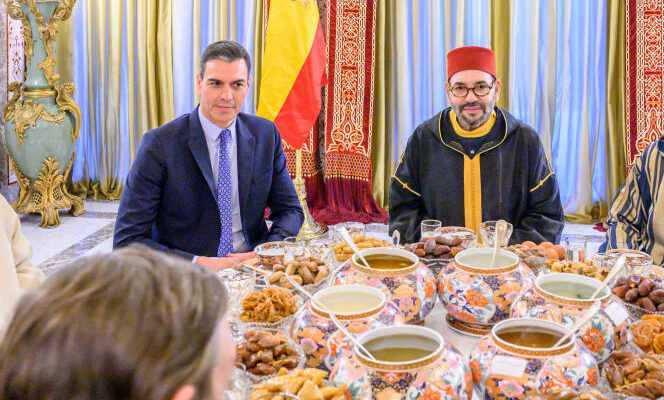After a year of estrangement, it was necessary to renew the diplomatic thread between Morocco and Spain: Pedro Sanchez, the head of the Spanish government, accompanied by the Minister of Foreign Affairs José Manuel Albares, was received in audience, Thursday 7 April, by King Mohammed VI before a “iftar”, the breaking of the Ramadan fast, offered in his honor. A mark of the importance of his visit in the eyes of Moroccans.
“We have agreed to define a sustainable and ambitious roadmap”Mr. Sanchez told reporters, calling his talks “historic moment”. In a joint declaration, the Moroccan sovereign and the head of the Spanish government agreed to“inaugurate an unprecedented stage in relations between the two countries” who had severed their diplomatic ties last year due to a conflict over Western Sahara.
This vast desert territory, rich in phosphates and with waters full of fish, has for decades opposed Morocco to the Sahrawi separatists of the Polisario Front, supported by Algeria. While Rabat advocates a status of autonomy under Moroccan sovereignty, the Polisario calls for a self-determination referendum under the aegis of the United Nations (UN).
“Sanchez’s Dangerous Game”
The normalization of relations between the two countries was made possible by Madrid’s decision to show its support for the Moroccan autonomy plan for Western Sahara. Spain “recognizes the importance of the Sahara issue for Morocco as well as Morocco’s serious and credible efforts within the framework of the United Nations to find a mutually acceptable solution”notes the joint statement.
“As such, Spain considers the Moroccan autonomy initiative, presented in 2007, as the most serious, realistic and credible basis for the resolution of this dispute”reaffirms the document.
A few hours before landing in Rabat, the Socialist Prime Minister suffered a setback in the Spanish Chamber of Deputies, which denounced the abandonment of the position “historical” of Madrid’s neutrality on the former Spanish colony.
If Mr. Sanchez has refuted any idea of ” turn “ on this file, he alienated his left-wing allies and the right-wing opposition, but also the Polisario and Algiers, Spain’s gas supplier. The Algerian daily Expression denounced Thursday “Sanchez’s dangerous game has aggravated tensions in the region”.
Reopening of borders
“One of the first objectives will be the restoration of the circulation of goods and merchandise at the border crossings of Ceuta and Melilla”, Spanish enclaves located on the northern coast of Morocco, said Mr. Sanchez after his brief trip. Morocco had stopped this cross-border trade, considered as smuggling, in 2019.
“We are going to proceed with the gradual reopening of border crossings, to guarantee an orderly flow of people (…) and goods will also circulate normally”promised the Spanish leader. “Maritime passenger links between the two countries will be restored immediately and gradually” until fully opened, details the statement.
A high-level meeting between the two governments is to be held before the end of the year to implement the ” roadmap “ established in Rabat. From “matters of common interest”are the “reactivation” cooperation on migration and the delimitation of territorial waters. Working groups will be set up to deal with these sensitive files.
Also among the priorities: trade and investment – Spain is Morocco’s leading trading partner – and energy cooperation after the closure by Algiers of the Maghreb-Europe (GME) gas pipeline.
For Madrid, the main purpose of restoring relations with Rabat is to ensure its ” cooperation “ in the control of illegal immigration while Morocco, from where most migrants leave for Spain, has been regularly accused, by many observers, of using them as a means of pressure.
The Spanish government also hopes that Rabat will tone down its claim to the enclaves of Ceuta and Melilla. But many analysts warn against the absence of real guarantees obtained by Spain from Morocco.
